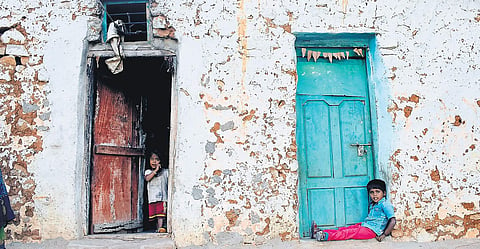

CHIKKABALLAPUR: Just 60km from Bengaluru’s Kempegowda International Airport (KIA) is Deshmar Thanda, a Lambani settlement where 23 families have been living for the past four decades without access to basic amenities, including drinking water, primary healthcare, roads and even education.
TNIE visited a government school in Bagepalli town, about 8.5km from Deshmar Thanda, where a group of girls narrated to this reporter the ordeal of their daily lives in a village forsaken by the government.
Eleven-year-old Kalpana (name changed) said: “In our thanda, we walk 1.5 km every day to get water; there are no pucca roads either. We walk for almost 2km through thorny paths to reach the bus stop, and then take a bus to reach school. We don’t even have a hospital in our village.”
TNIE decided to check out this rather unbelievable story about a village on the outer hem of global city Bengaluru and found that Deshmar Thanda was, indeed, frozen in time, untouched by development.
The thanda, which falls under Kanagamakalapalli gram panchayat, is a Lambani settlement in existence for the past 45 to 50 years. “We’ve been living here for more than 40 years now. We’ve always been neglected by our gram panchayat, and have to run back and forth to their offices for everything,” said Nagraj (name changed) of the village.
Kids walk 2 km to school
The villagers, who have at least three families with children of ages eligible to be admitted to anganwadis, refuse to do so as they dread walking almost 2km over thorny, muddy paths with their children to reach the anganwadi.
“I am used to these roads. But I get tired carrying my four-year-old daughter and walking such long distances in the scorching heat. It’s horrible during the rainy season too,” complained Lakshmi, mother of a toddler and a four-year-old.
The families here have decided that education for their children would start only at the age of eight, when they are ready to either walk for an hour to Nellampalli village, which is about 4km away, and then take a bus from to Bagepalli, which is again a 30-minute drive.
“We start as early as 6.30am and reach school by 8am. When we leave late, it gets dark by the time we get home, and dealing with rodents and snakes on the way is common,” says Nirmala, a Class 8 student.
Most of the boys discontinue their education after Class 10. They are either sent to Mumbai to earn their living or go to nearby fields to work. Girls finish their education till high school with great difficulty.
“We love to study but are forced to stay home as our parents fear for our security when we walk to school. The roads are so lonely, anything could happen.” said Sangeetha, 13.
However, the government school at Bagepalli has now provided them with free hostel facilities and the authorities are trying to convince parents to send their children.“We have no choice but to leave our children at the government hostel. If we have to give them an education, we have to let go of our children and see them only once a month or during holidays,” said Kanchana, whose daughter is in Class 9 and stays at the hostel.
NO ACCESS TO WATER
The villagers dread summer. Deshmar Thanda is located in the drought-affected taluk of Chikkaballapur. “Water is a luxury for us. Our women walk 1.5 km to fetch water from a stored borewell water pit from someone’s farmland, to wash clothes and take a bath. The same water is later brought to drink. This has been the reason for many health issues and illnesses in our thanda, including dehydration, cough, cold etc,” said Dhanesh, a resident of the village.
There was only one hand pump in the village that stopped working eight months ago. Villagers now use it to tie their cattle, and children play with its lever. The water in the borewell dried up and no efforts were made to drill another one. Water tankers roll into the village once a fortnight, and agree to come right in only after many requests from the villagers.
NEAREST HOSPITAL 15 KM AWAY
It won’t be an exaggeration to say that there is no access to healthcare over a radius of 15 km from Deshmar Thanda. They have to walk till Nellampalli and wait for the bus to take them to Bagepalli Government Hospital. There have been cases when deliveries have turned disastrous for these families. According to Kamakshi, 65, “I have seen women suffer during pregnancy and delivery.
Our grandchildren have health problems, and all we can do is provide some home remedies or be ready to walk to the nearest village.” A 30-year-old woman dreads those days when her daughter gets her monthly period. “She gets terrible stomach cramps and heavy flow. I can’t take her to a doctor as we have to travel at least 15 km to reach a hospital,” she said. Meanwhile, a human rights activist based in Kolar, said there is heavy flurosis in the water they drink, which further complicates their health issues. Meanwhile, a doctor at the government hospital in Bagepalli says thirty to forty percent of the patients show symptoms of fluorosis.